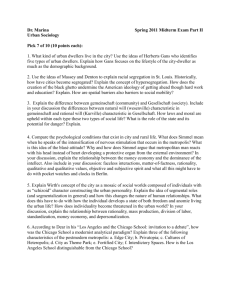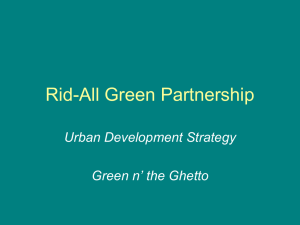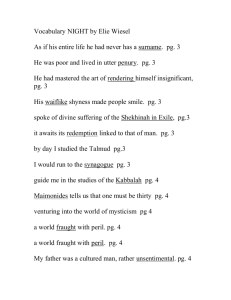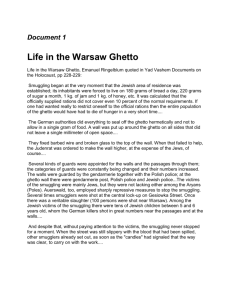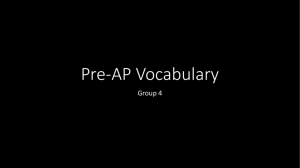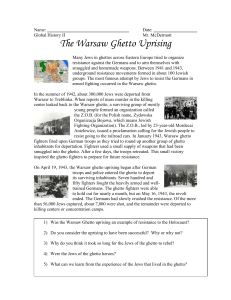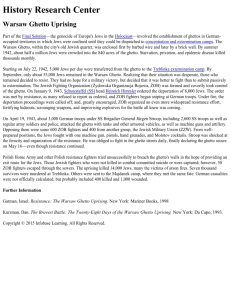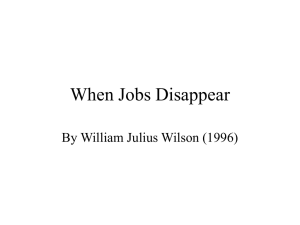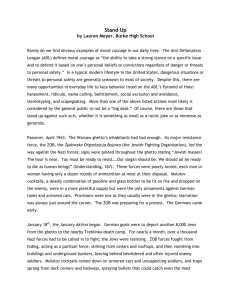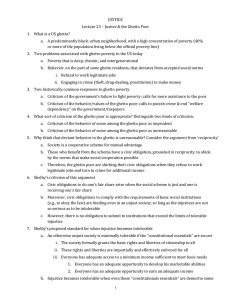Final Rhetorical Analysis Essay
advertisement
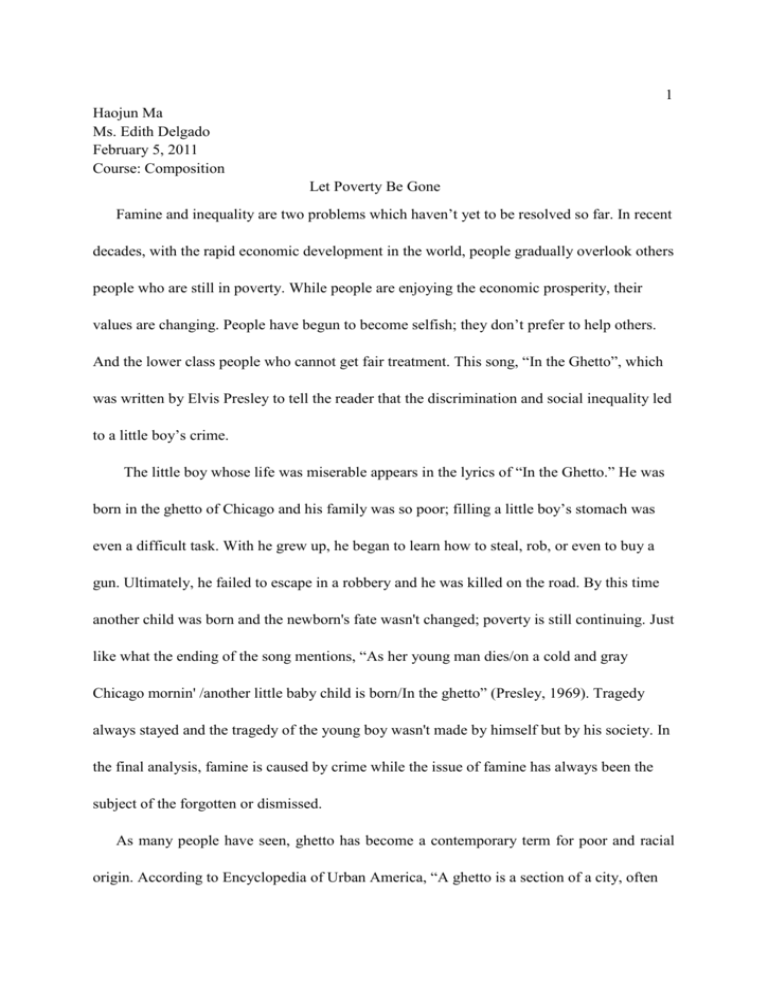
1 Haojun Ma Ms. Edith Delgado February 5, 2011 Course: Composition Let Poverty Be Gone Famine and inequality are two problems which haven’t yet to be resolved so far. In recent decades, with the rapid economic development in the world, people gradually overlook others people who are still in poverty. While people are enjoying the economic prosperity, their values are changing. People have begun to become selfish; they don’t prefer to help others. And the lower class people who cannot get fair treatment. This song, “In the Ghetto”, which was written by Elvis Presley to tell the reader that the discrimination and social inequality led to a little boy’s crime. The little boy whose life was miserable appears in the lyrics of “In the Ghetto.” He was born in the ghetto of Chicago and his family was so poor; filling a little boy’s stomach was even a difficult task. With he grew up, he began to learn how to steal, rob, or even to buy a gun. Ultimately, he failed to escape in a robbery and he was killed on the road. By this time another child was born and the newborn's fate wasn't changed; poverty is still continuing. Just like what the ending of the song mentions, “As her young man dies/on a cold and gray Chicago mornin' /another little baby child is born/In the ghetto” (Presley, 1969). Tragedy always stayed and the tragedy of the young boy wasn't made by himself but by his society. In the final analysis, famine is caused by crime while the issue of famine has always been the subject of the forgotten or dismissed. As many people have seen, ghetto has become a contemporary term for poor and racial origin. According to Encyclopedia of Urban America, “A ghetto is a section of a city, often 2 part of the inner city, where one particular ethnic or racial group predominates, frequently because of social and economic restrictions imposed by the majority population. Initially a European institution that established and required segregated Jewish residential areas, scholars in the United States have applied the term ghetto to inner-city residential areas of racial minorities and white ethnic groups”(James,1998). This information tells the readers the development process of ghetto and its current situation in which the minority is restricted from both human right and economics in city. If many people indulge in the exclusion of minorities or groups, then they will live with suspicion and violence. Just as the lyrics depict “Then one night in desperation a young man breaks away/He buys a gun, steals a car/ tries to run, but he doesn't get far” (Presley, 1969). Also, the word ghetto covers a variety of forms, and easy generalizations are dangerous. This extends to the notion that all ghettos are slums. While many ghettos emerged in older residential districts close to downtown, not all did so. According to the integration debate, Competing Futures for American Cities, “Harlem formed as a newly constructed community intended for middle–and upper-income whites. The Great Depression helped turn it into a slum. Nevertheless, wealthy neighborhoods have continued to persist within the ghetto” (Hartman, 2010). This information shows that not only the poor live in the ghetto; however, no one is willing to help the hero in the song when he is in the case of hunger. The author tries to tell the audiences that people’s indifference exacerbates the extent of poverty. Therefore, the problem of famine should be the central world's attention. Even in the heart of the United States, there are hungry people on the streets; as for the backward 3 countries, it is easy to imagine the tragic extent. Aiming to expose U.S. poverty, the book, Congressional digest, which presents information on poverty in the U.S. Statistics collected for the 2010 Census Population Report of the U.S. Census Bureau are reviewed. Topics that were discussed include recessions, poverty among Hispanic Americans, and poor families, “The poverty rate for children is compared to the poverty rate for people aged 18 to 64 is increasing. Many poor families only get small amount of aid from the society and they grow up with little education, which increases the number of poor people” (Groves, 2010). The United States has not yet resolved the problems of hunger and race to a similar level at the extremely backward economy in Africa whose standard of living is terrible. Wilkinson argues, “There are no hospitals and no good schools in Africa. Most children in African slums do not go to school and most get no medical attention when needed. There are just few chemist shops around most of which sell cheap and expired drugs. Majority of the children in African slums has lost either one or both parents” (Wilkinson, 2009). If even the most basic of life needs are difficult to achieve, then how citizens receive a good education. Without the influence of education, then the quality and awareness are only on paper, while the increasing crime rate is not surprising. In addition, the spread of poverty is the result of distorted values; wrong values always result in the wrong direction. As hungry as the hero of the story was, he did not get any help. When people are in trouble, the others seem numb; they prefer fighting for their own benefits to helping others. The plot of the song, “In the Ghetto”, also reflects the character of the people who are selfish and insensitive, “People, don't you understand /the child needs a 4 helping hand/or he'll grow to be an angry young man someday/ Take a look at you and me/are we too blind to see/do we simply turn our heads/and look the other way” (Presley, 1969). People are not willing to make contributions to others because they are selfish; they have in common under the contemporary worship of money. Even though the founding of the United States was to promote equality, the lives of so many people are in dire straits. Talking equality and inequality without any action, this will lead to a loss of human rights. Two famous editors, Sandin and Wester, argued that people become selfish and turn to looting, price gouging and other immoral behavior in emergencies. This has been the basis for an argument justifying extraordinary measures in emergencies. It states that if emergencies are not curtailed, breakdown of moral norms is threatened (Sandin&Wester, 2009). The academic article tells the audience that correcting the wrong values of people has become an urgent thing. For example, the ghetto inhabited by this minority, in the corner of the city, has been ignored by the public. It is as if the ghetto and the city deliberately have drawn a line, which in turn reflects the racial discrimination still exists in America today. So each city is full of so much violence and crime, which truly appears in this song “As a crowd gathers 'round an angry young man/face down on the street with a gun in his hand/in the ghetto” (Presley, 1969). A naive boy turned into criminals, is this not a social tragedy? What’s more, the wrong direction of policy chosen by the U.S government is another key factor which also contributes to the social tragedy.The U.S. government seems to try to shift the public's attention to some sensitive topics, such as the Iraq war, and Sino-US trade,. As we all know, the U.S. government invested heavily in the Iraq war. According to 5 the Washington Post, “In early 2008, we put the total cost to the United States of the Iraq war at $3 trillion. This price tag dwarfed previous estimates, including the Bush administration's 2003 projections of a $50 billion to $60 billion war” (Joseph, 2010). Huge pay was spent for the Iraq War, in turn, increased the intensification of domestic poor. However, the U.S government began to blame economic problems on the Sino-US trade deficit. According to International Journal of Business and Management, “Currently, the U.S. unemployment rate is high, more than 6%. Since a large number of goods are imported from China, both China and the U.S. have been massive trade deficit. "Made in China," that has already led to tens of millions of American workers lost jobs (Lawrence, 2004). If that was true, why didn’t the U.S government build factories in U.S instead? Even if tens of millions of American worker lost jobs, United States still wouldn’t take any effective measures to solve this problem. This scene of the song still exists today, “Well the world turns/ and a hungry little boy with a runny nose/ plays in the street as the cold wind blows/in the ghetto” (Presley, 1969). The readers can imagine that the little boy has a very poor family and his parents probably lost jobs so that they weren’t able to raise the boy well. It is very ridiculous to put the blame to China rather than the U.S government which made wrong decisions. Understanding and communication should be both great ways to solve the inequality of human rights and the struggles for social security. The government should promote and guide the people to assist the poor through public interest; meanwhile, each person should have stretched out his hands to help people in need, then human rights would be protected. Only 6 when people realize that many people are struggling for survival and everyone is treated equally, in that way, can human society can be formed. Reference: Groves, G. (2010). Congressional digest . New York, NY: W.W.North Wilkinson, J. (2009, April 22). Poverty in africa. Point Newspaper, p. B1. Presley, Elvis (Lyricist). (1969). In the ghetto. [Medium of recording: Record] Memphis: American Sound Studio. James, M. (1998). The Cities and Suburbs. Encyclopedia of urban amer ica. Retrieved from http://0-www.credoreference.com.portal.tamucc.edu/entry/abcurban/ghetto Sandin, P. & Wester, M. (2009). The moral black hole. Ethical Theory & Moral Practice, 12(3), 291-301. Joseph, E. (2010, September 5). The washington post. The true cost of the Iraq war: $3 trillion and beyond, p. B7. LastLawrence , W.J. (2010). A cluster approach towards enhancing chinese american trade opportunities . International Journal of Business and Management , 122(5), 24-25.
